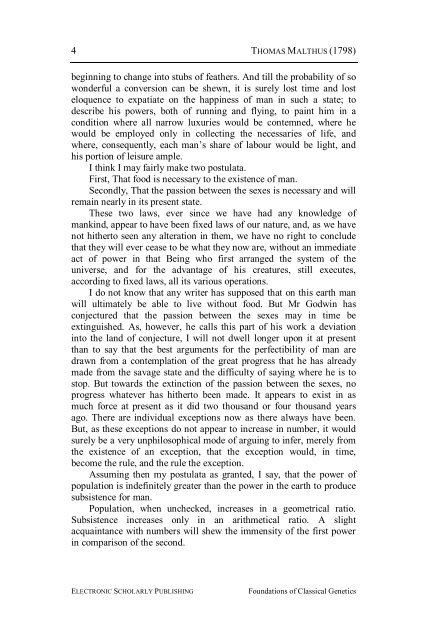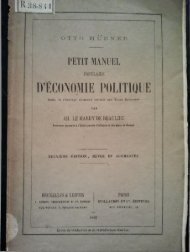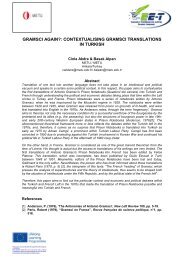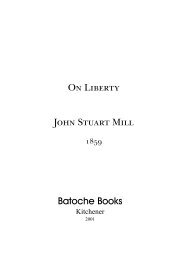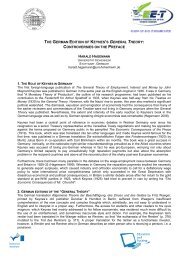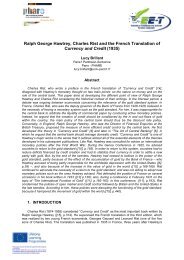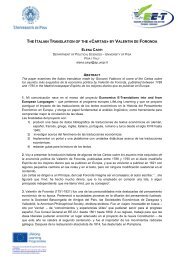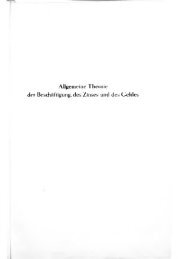Malthus, Thomas, Robert, An Essay on the Principle of Population ...
Malthus, Thomas, Robert, An Essay on the Principle of Population ...
Malthus, Thomas, Robert, An Essay on the Principle of Population ...
You also want an ePaper? Increase the reach of your titles
YUMPU automatically turns print PDFs into web optimized ePapers that Google loves.
4 THOMAS MALTHUS (1798)<br />
beginning to change into stubs <strong>of</strong> fea<strong>the</strong>rs. <str<strong>on</strong>g>An</str<strong>on</strong>g>d till <strong>the</strong> probability <strong>of</strong> so<br />
w<strong>on</strong>derful a c<strong>on</strong>versi<strong>on</strong> can be shewn, it is surely lost time and lost<br />
eloquence to expatiate <strong>on</strong> <strong>the</strong> happiness <strong>of</strong> man in such a state; to<br />
describe his powers, both <strong>of</strong> running and flying, to paint him in a<br />
c<strong>on</strong>diti<strong>on</strong> where all narrow luxuries would be c<strong>on</strong>temned, where he<br />
would be employed <strong>on</strong>ly in collecting <strong>the</strong> necessaries <strong>of</strong> life, and<br />
where, c<strong>on</strong>sequently, each man’s share <strong>of</strong> labour would be light, and<br />
his porti<strong>on</strong> <strong>of</strong> leisure ample.<br />
I think I may fairly make two postulata.<br />
First, That food is necessary to <strong>the</strong> existence <strong>of</strong> man.<br />
Sec<strong>on</strong>dly, That <strong>the</strong> passi<strong>on</strong> between <strong>the</strong> sexes is necessary and will<br />
remain nearly in its present state.<br />
These two laws, ever since we have had any knowledge <strong>of</strong><br />
mankind, appear to have been fixed laws <strong>of</strong> our nature, and, as we have<br />
not hi<strong>the</strong>rto seen any alterati<strong>on</strong> in <strong>the</strong>m, we have no right to c<strong>on</strong>clude<br />
that <strong>the</strong>y will ever cease to be what <strong>the</strong>y now are, without an immediate<br />
act <strong>of</strong> power in that Being who first arranged <strong>the</strong> system <strong>of</strong> <strong>the</strong><br />
universe, and for <strong>the</strong> advantage <strong>of</strong> his creatures, still executes,<br />
according to fixed laws, all its various operati<strong>on</strong>s.<br />
I do not know that any writer has supposed that <strong>on</strong> this earth man<br />
will ultimately be able to live without food. But Mr Godwin has<br />
c<strong>on</strong>jectured that <strong>the</strong> passi<strong>on</strong> between <strong>the</strong> sexes may in time be<br />
extinguished. As, however, he calls this part <strong>of</strong> his work a deviati<strong>on</strong><br />
into <strong>the</strong> land <strong>of</strong> c<strong>on</strong>jecture, I will not dwell l<strong>on</strong>ger up<strong>on</strong> it at present<br />
than to say that <strong>the</strong> best arguments for <strong>the</strong> perfectibility <strong>of</strong> man are<br />
drawn from a c<strong>on</strong>templati<strong>on</strong> <strong>of</strong> <strong>the</strong> great progress that he has already<br />
made from <strong>the</strong> savage state and <strong>the</strong> difficulty <strong>of</strong> saying where he is to<br />
stop. But towards <strong>the</strong> extincti<strong>on</strong> <strong>of</strong> <strong>the</strong> passi<strong>on</strong> between <strong>the</strong> sexes, no<br />
progress whatever has hi<strong>the</strong>rto been made. It appears to exist in as<br />
much force at present as it did two thousand or four thousand years<br />
ago. There are individual excepti<strong>on</strong>s now as <strong>the</strong>re always have been.<br />
But, as <strong>the</strong>se excepti<strong>on</strong>s do not appear to increase in number, it would<br />
surely be a very unphilosophical mode <strong>of</strong> arguing to infer, merely from<br />
<strong>the</strong> existence <strong>of</strong> an excepti<strong>on</strong>, that <strong>the</strong> excepti<strong>on</strong> would, in time,<br />
become <strong>the</strong> rule, and <strong>the</strong> rule <strong>the</strong> excepti<strong>on</strong>.<br />
Assuming <strong>the</strong>n my postulata as granted, I say, that <strong>the</strong> power <strong>of</strong><br />
populati<strong>on</strong> is indefinitely greater than <strong>the</strong> power in <strong>the</strong> earth to produce<br />
subsistence for man.<br />
Populati<strong>on</strong>, when unchecked, increases in a geometrical ratio.<br />
Subsistence increases <strong>on</strong>ly in an arithmetical ratio. A slight<br />
acquaintance with numbers will shew <strong>the</strong> immensity <strong>of</strong> <strong>the</strong> first power<br />
in comparis<strong>on</strong> <strong>of</strong> <strong>the</strong> sec<strong>on</strong>d.<br />
ELECTRONIC SCHOLARLY PUBLISHING<br />
Foundati<strong>on</strong>s <strong>of</strong> Classical Genetics


